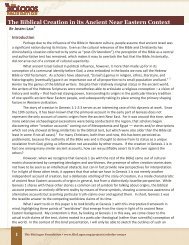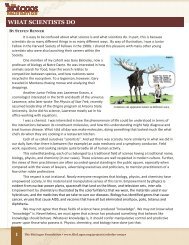Miracles and Science: The Long Shadow of David Hume - BioLogos
Miracles and Science: The Long Shadow of David Hume - BioLogos
Miracles and Science: The Long Shadow of David Hume - BioLogos
Create successful ePaper yourself
Turn your PDF publications into a flip-book with our unique Google optimized e-Paper software.
<strong>The</strong> <strong>BioLogos</strong> Foundation • www.<strong>BioLogos</strong>.org/projects/scholar-essays<br />
26. <strong>The</strong> Cambridge evolutionary biologist Simon Conway Morris notes: “I am not surprised at those [NT miracles] reported, I am<br />
surprised that they are so few. What else would you expect when the Creator visits his Creation” Hulsean Sermon, Great St.<br />
Mary’s Cambridge 26 Feb, (2006).<br />
27. For a popular exposition I recommend the classic Who moved the Stone, (Faber <strong>and</strong> Faber, London, 1975) written by a<br />
lawyer, Frank Morrison, who initially set out to disprove the resurrection. For a more sophisticated <strong>and</strong> modern discussion I<br />
recommend <strong>The</strong> Case for the Resurrection <strong>of</strong> Jesus, G. Habermas <strong>and</strong> M. Licona (Kregel, Gr<strong>and</strong> Rapids, 2004) <strong>and</strong> <strong>The</strong><br />
Resurrection <strong>of</strong> the Son <strong>of</strong> God, N.T. Wright (SPCK, London 2003).<br />
28. R. Bultmann in Kerygma <strong>and</strong> Myth: A <strong>The</strong>ological Debate, ed. H. W. Bartsch, trans. R. H. Fuller (New York: Harper & Row,<br />
1961), 5.<br />
29. John Polkinghorne, Serious Talk: <strong>Science</strong> <strong>and</strong> Religion in Dialogue, (Harrisburg: Trinity Press International, 1995).<br />
30. This quote comes from the essay “<strong>The</strong>ology as Poetry”, in C.S. Lewis, <strong>The</strong> weight <strong>of</strong> glory, Harper Collins, San Francisco<br />
(2001)<br />
31. Richard Dawkins would be a prime example. Of course he is entitled to his philosophical views <strong>and</strong> is welcome to popularize<br />
these. But I worry that when science is used to justify unbelief, or a host <strong>of</strong> other issues that it in fact has little to say about,<br />
the end result is even more anti-science feeling amongst the general public.<br />
32. We don’t have direct access to the mind <strong>of</strong> God. We therefore need special revelation to know when, for his own<br />
redemptive purposes, God performed miracles in the past. See e.g. E. Lucas, Can we believe Genesis today, (IVP, Leicester<br />
2001),<br />
33. See e.g. D. R. Alex<strong>and</strong>er, Rebuilding the Matrix: <strong>Science</strong> <strong>and</strong> Faith in the 21st Century, (Lion, Oxford, 2002); D.R. Falk, Coming<br />
to Peace with <strong>Science</strong>, (IVP, Downers Grove, 2004); F. S. Collins, <strong>The</strong> Language <strong>of</strong> God: A Scientist Presents Evidence for<br />
Belief, (Free Press, New York 2006). Note that these authors believe that God can still act miraculously today if he chooses<br />
to.<br />
34. Quote from C. Humphreys, http://www.st-edmunds.cam.ac.uk/faraday/CIS/humphreys/Humphreys_lecture.htm. I realize<br />
that the question <strong>of</strong> why God does, or, more importantly, does not perform a miracle, is a particularly vexing one, especially<br />
when a miracle would alleviate innocent suffering. As critical (<strong>and</strong> interesting) as the relationship between miracles <strong>and</strong><br />
theodicy is, it unfortunately falls outside the scope <strong>of</strong> the present essay.<br />
13<br />
<strong>Miracles</strong> <strong>and</strong> <strong>Science</strong>:<br />
<strong>The</strong> <strong>Long</strong> <strong>Shadow</strong> <strong>of</strong> <strong>David</strong> <strong>Hume</strong><br />
BY ARD LOUIS




